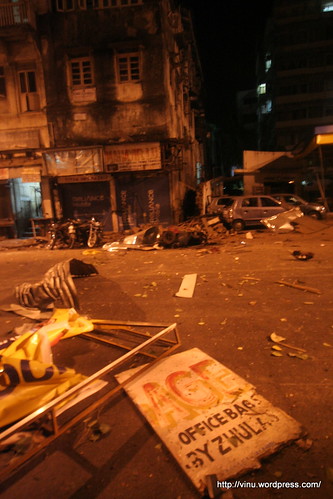Thursday
Nov272008
Latest from Mumbai (1:17 p.m. local time; 7:47 a.m. in Britain)
 Thursday, November 27, 2008 at 7:49
Thursday, November 27, 2008 at 7:49
Not much change in a tragic and tense situation. Struggling for new information, broadcast news organisations are filling time with eyewitness accounts, especially from those who were in the Taj and Oberoi hotels, and comments from experts who really have little to add.
More than 100 dead and more than 300 injured. The Times of India, relying on Indian military sources, says four terrorists are still inside the Taj Hotel, along with 40 to 50 trapped guests. Twitter feed indicates explosions and gunshots at Oberoi Hotel.
While the conflict continues, it is unclear who is behind the attacks. The "Deccan Mujihadeen" have claimed responsiblity. Given the level of coordination and range of targets and given that no security services have previously known of the group, it is unlikely that they are the culprits.
More than 100 dead and more than 300 injured. The Times of India, relying on Indian military sources, says four terrorists are still inside the Taj Hotel, along with 40 to 50 trapped guests. Twitter feed indicates explosions and gunshots at Oberoi Hotel.
While the conflict continues, it is unclear who is behind the attacks. The "Deccan Mujihadeen" have claimed responsiblity. Given the level of coordination and range of targets and given that no security services have previously known of the group, it is unlikely that they are the culprits.
 Scott Lucas |
Scott Lucas |  1 Comment |
1 Comment | tagged  Deccan Mujahideen,
Deccan Mujahideen,  Mumbai,
Mumbai,  Mumbai attacks,
Mumbai attacks,  Oberoi Hotel,
Oberoi Hotel,  Taj Hotel,
Taj Hotel,  Twitter in
Twitter in  India & Pakistan
India & Pakistan
 Deccan Mujahideen,
Deccan Mujahideen,  Mumbai,
Mumbai,  Mumbai attacks,
Mumbai attacks,  Oberoi Hotel,
Oberoi Hotel,  Taj Hotel,
Taj Hotel,  Twitter in
Twitter in  India & Pakistan
India & Pakistan 
